As the crisp autumn air descends upon your surroundings, it's time to prepare for the seasonal changes that can impact your poodle's well-being. From adjusting grooming routines to adapting exercise regimens, staying vigilant in caring for your furry companion is paramount. Let's explore how you can ensure your poodle stays healthy and happy through the shifting seasons.
Key Takeaways
- Provide winter shelter and monitor for discomfort in poodles.
- Recognize signs of heat stress and ensure cool shelter in summer.
- Care for elderly poodles during extreme temperatures.
- Protect poodle paws and regulate body temperature for seasonal comfort.
Poodle Breed Varieties
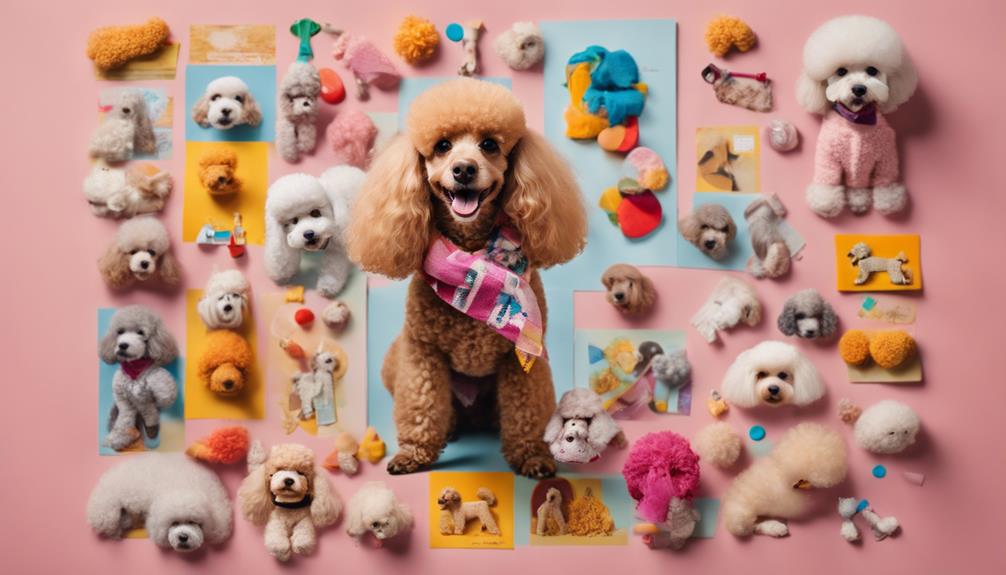
When choosing a poodle for your family, it is essential to consider the various breed varieties available to find the perfect match for your lifestyle and preferences. Poodles come in three main sizes: standard, miniature, and toy. Standard poodles are athletic and energetic, making them great companions for active families. They thrive on physical activities and excel in obedience training. On the other hand, miniature poodles are affectionate and playful indoor pets that enjoy being around their human companions. Their smaller size makes them well-suited for apartment living or homes with limited space. Toy poodles, the smallest of the three varieties, are intelligent lap dogs known for their lively nature. They are highly adaptable and form strong bonds with their owners. All poodles share common characteristics such as intelligence, playfulness, loyalty, and being hypoallergenic, which makes them an excellent choice for families with allergies.
Poodle Personality and Behavior

Exploring the intricacies of Poodle personality and behavior reveals a delightful blend of intelligence, sociability, and mischievous charm that sets this breed apart. Poodles, known for their exceptional intelligence and ranking second in canine intelligence tests, are highly trainable. They excel in obedience training and agility competitions, showcasing their eager-to-please nature. Beyond their intellect, Poodles are social creatures that thrive on human companionship, making them wonderful family pets. Despite their elegant appearance, they possess a playful and mischievous side, adding a touch of fun to every interaction. Additionally, the Poodle's hypoallergenic coat makes them suitable for owners with allergies, allowing more individuals to enjoy the companionship of this remarkable breed. Whether as a loyal companion or an agile partner in training, Poodles bring a unique mix of qualities that cater to various lifestyles, making them a versatile and cherished addition to any household.
Feeding Guidelines and Portions
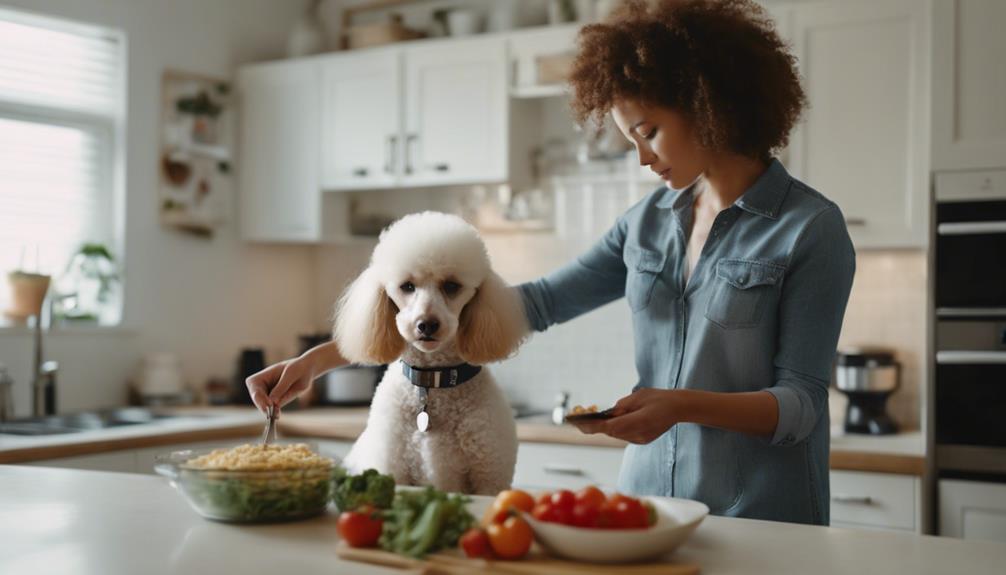
When feeding your Poodle, it's crucial to consider their individual needs based on factors like age, weight, and activity level. By following recommended portion sizes and ensuring a balanced diet, you can help maintain your Poodle's overall health and well-being. Adjusting their food intake according to seasonal changes and consulting with your vet for personalized advice are essential steps in providing optimal nutrition for your furry companion.
Portion Control Importance
Proper portion control plays a vital role in safeguarding your Poodle's health and preventing obesity-related complications. By following feeding guidelines tailored to your pet's size, age, and activity level, you can ensure they receive the right amount of food. Overfeeding can lead to obesity, shortening your Poodle's lifespan and increasing the risk of health issues like joint problems. Maintaining the recommended portion sizes is crucial to provide your Poodle with the necessary nutrients for optimal health. Consulting with a veterinarian will help you establish a personalized feeding plan that meets your Poodle's specific needs and dietary requirements. Remember, portion control is key to keeping your Poodle healthy and happy for years to come.
Nutrient Balance for Health
To maintain your Poodle's overall health and well-being, it is crucial to ensure their diet is balanced with the right combination of proteins, vitamins, minerals, and carbohydrates. Here are some essential feeding guidelines to help you achieve nutrient balance for your furry friend:
- Proteins: Provide high-quality protein sources like lean meats or fish to support your Poodle's muscle health.
- Vitamins: Ensure your Poodle gets a variety of vitamins from fruits and vegetables to boost their immune system.
- Minerals: Incorporate minerals like calcium and iron for strong bones and overall vitality.
- Carbohydrates: Opt for complex carbohydrates such as whole grains to maintain energy levels throughout the day.
Seasonal Feeding Adjustments
Adjust your Poodle's food portions based on their activity level and seasonal temperature changes to ensure optimal health and well-being. In colder months, consider increasing protein intake to support energy and warmth. Be mindful of reduced activity levels in hot weather; adjust feeding amounts to prevent weight gain. Supplement your Poodle's diet with fresh, seasonal fruits and vegetables as healthy treats. It's crucial to consult with your veterinarian for specific feeding guidelines tailored to your Poodle's individual needs during different seasons.
| Seasonal Feeding Adjustments | Considerations | Actions |
|---|---|---|
| Hot Weather | Watch for reduced activity | Decrease feeding amounts to avoid weight gain |
| Cold Weather | Increase protein intake | Provide warmth and energy support |
| General Tips | Offer fresh fruits and vegetables | Consult veterinarian for personalized guidance |
Essential Nutrients for Poodles

For optimal health and well-being, ensure your poodle's diet includes essential nutrients like proteins, vitamins, and minerals. Providing a balanced diet tailored to your poodle's breed and life stage is crucial for preventing health issues. Here are some key nutrients to prioritize in your poodle's diet:
- Proteins: Essential for muscle development and overall body function, proteins sourced from high-quality meats like chicken or fish are vital for your poodle's health.
- Vitamins and Minerals: These micronutrients play a crucial role in supporting various bodily functions, from maintaining a healthy coat to boosting the immune system. Include a variety of fruits and vegetables like pumpkin and carrots to provide these essential vitamins and minerals.
- Omega Fatty Acids: Found in fish oil and flaxseed, omega fatty acids are beneficial for your poodle's skin health and coat condition.
- Antioxidants: Incorporating antioxidants from sources like berries can help protect your poodle's cells from damage and promote overall well-being. Remember, a well-rounded diet is key to keeping your poodle healthy and happy.
Brushing and Preventing Matting

Regular brushing of your Poodle's curly coat is essential to prevent matting and maintain their overall skin health and comfort. Poodles, with their curly coats, are prone to tangles that can lead to mats if not properly cared for. To prevent matting, use a slicker brush and gently brush from head to tail, making sure to remove any loose fur that could contribute to tangles. It's recommended to brush your Poodle at least every other day to keep their coat healthy and free of painful mats.
Matting can cause skin irritation, discomfort, and even skin infections if left unaddressed. By incorporating regular brushing into your Poodle's grooming routine, you not only prevent matting but also help distribute natural oils, improve blood circulation, and maintain a shiny and healthy coat. Remember, proper brushing is not just about aesthetics; it's a vital part of your Poodle's overall well-being.
Bathing and Skin Health
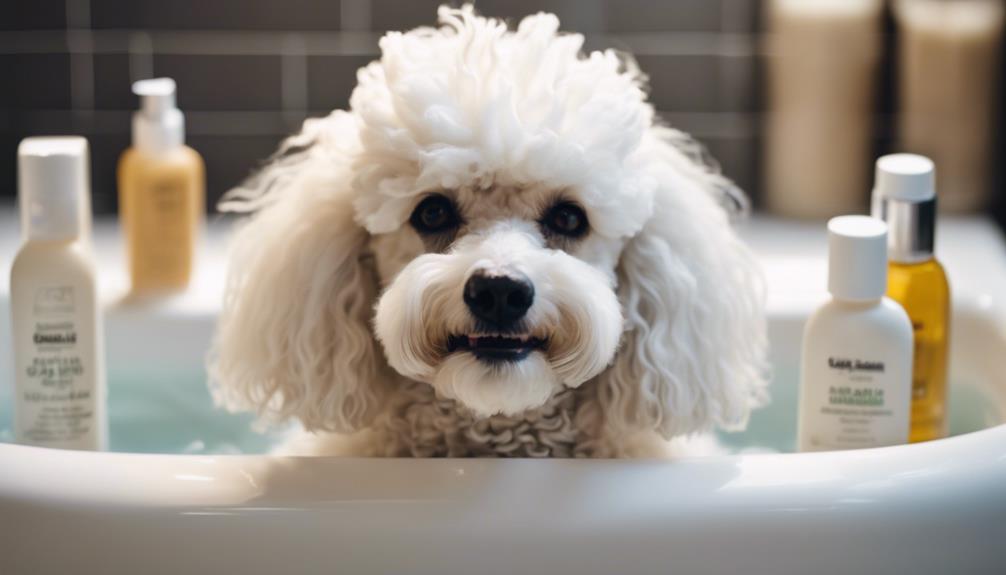
To maintain your Poodle's skin health and cleanliness, it is recommended to bathe your furry companion every 3-6 weeks with a mild dog shampoo. Here are some tips to ensure your Poodle's skin stays healthy and free from issues:
- Use Lukewarm Water: When giving your Poodle a bath, make sure the water is lukewarm. Hot water can dry out their skin, leading to irritation.
- Choose a Moisturizing Shampoo: Opt for a moisturizing shampoo specifically designed for dogs. This helps to prevent skin dryness and irritation, keeping your Poodle's skin healthy.
- Gentle Towel Drying: After bathing your Poodle, gently towel dry their fur. This helps to remove excess water and prevents skin issues that can arise from prolonged dampness.
- Regular Baths: Regular baths are essential to keep your Poodle's skin free from dirt, allergens, and potential irritants. It also helps maintain a shiny, healthy coat for your beloved pet.
Daily Exercise Needs
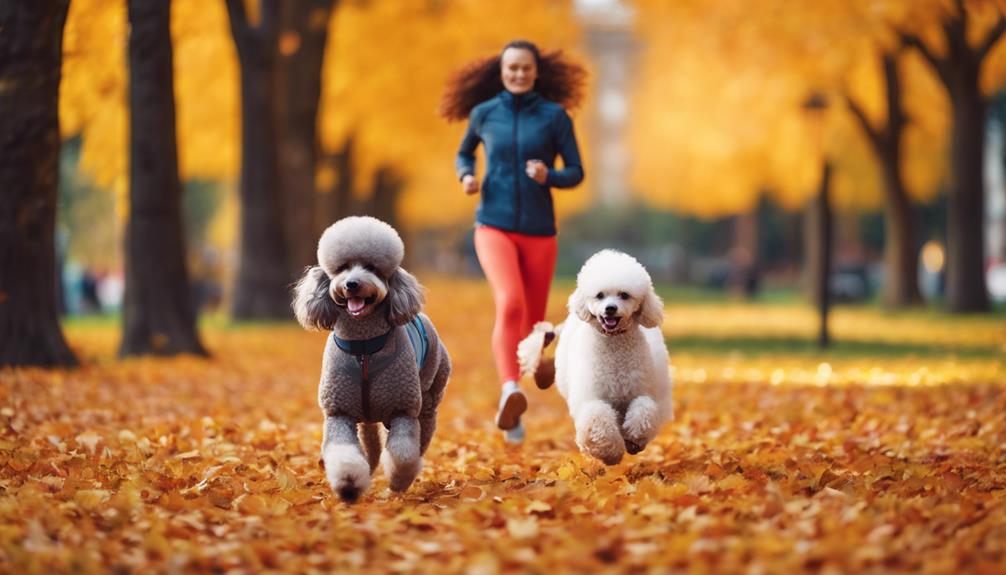
To ensure the optimal health and well-being of your Poodle, it is crucial to meet their daily exercise needs with at least two walks lasting a minimum of 20 minutes each. Regular exercise not only keeps your Poodle physically fit but also stimulates their mind, promoting overall wellness. When taking your Poodle for walks, consider the following tips to prevent heat-related issues and ensure their safety:
| Daily Exercise Tips for Poodles | ||
|---|---|---|
| Schedule walks during cooler times | such as early morning or | late evening to avoid |
| Provide shaded routes with breaks | for rest and hydration. | |
| Learn signs of heat stroke in | Poodles, like heavy | panting and rapid |
| Monitor your Poodle's body | temperature and seek | veterinary care if |
| Ensure your Poodle's well-being by | observing signs of heat | stress is noticed. |
Interactive Play and Mental Stimulation

For optimal mental stimulation and overall well-being, interactive play is essential for your Poodle to prevent boredom and foster a strong bond with you. Engage in activities like hide-and-seek, puzzle toys, and obedience training to challenge your Poodle's mind. Here are some tips to promote mental stimulation in your furry friend:
- Rotate Toys: Regularly switch out toys to maintain your Poodle's interest and provide new challenges.
- Interactive Play Sessions: Incorporate interactive play sessions to improve your Poodle's problem-solving skills and cognitive abilities.
- Engage in Brain Games: Stimulate your Poodle's mind with brain games that require them to think and strategize.
- Reward Cognitive Efforts: Encourage and reward your Poodle's cognitive efforts during playtime to boost their confidence and motivation.
Obedience Training Techniques

Implementing effective obedience training techniques is crucial for nurturing a strong bond and clear communication between you and your Poodle. Positive reinforcement methods like clicker training work well for obedience training in Poodles. Consistency, patience, and rewards are essential elements for success. By using reward-based training, you can improve communication, strengthen the bond, and build trust with your Poodle. Poodles respond positively to this approach, focusing on positive reinforcement. Teaching basic commands such as sit, stay, come, and heel is fundamental for a well-trained Poodle. Remember, consistency is key in obedience training. When your Poodle follows commands correctly, reward them promptly to reinforce good behavior. This not only helps in training but also enhances the relationship you have with your furry friend. By incorporating these techniques into your routine, you'll create a harmonious environment where your Poodle thrives.
Socialization and Behavioral Health

Ensuring your Poodle is well-socialized is key to fostering good behavior and preventing issues like aggression or fear. Introducing your Poodle to various experiences, people, and animals from a young age can help them feel more confident and adaptable. Remember, consistent positive socialization practices are essential for a well-adjusted and well-behaved Poodle in different situations.
Proper Socialization Techniques
To foster a well-adjusted and confident Poodle, early exposure to diverse environments, individuals, and animals is key in building their social skills and reducing potential fears. Here are some proper socialization techniques for your beloved Poodle:
- Gradual Exposure: Introduce your Poodle slowly to new experiences, sounds, and smells to prevent anxiety and aggression later on.
- Positive Reinforcement: Use treats, praise, and play during socialization sessions to create a positive association with new stimuli.
- Puppy Socialization Classes: Enroll your Poodle in these classes for structured interactions with other dogs and professional guidance on socialization.
- Consistent Socialization: Maintain regular socialization throughout your Poodle's life to support good behavioral health, adaptability, and sociability.
Addressing Behavioral Issues
Establishing a strong foundation of socialization is pivotal in addressing behavioral issues and promoting overall behavioral health in your Poodle. Socialization helps prevent problems like aggression and fearfulness. Utilizing positive reinforcement methods can shape desired behaviors, while consistent routines and boundaries establish good behavior patterns. Engage in interactive play and provide mental stimulation to reduce behavioral issues. If you encounter complex problems, seek professional help from trainers or behaviorists. Remember, patience and understanding are key in addressing your Poodle's behavioral challenges. By focusing on socialization, positive reinforcement, consistent routines, interactive play, mental stimulation, and seeking professional assistance when needed, you can help your Poodle lead a happy and well-adjusted life.
Importance of Training
Training your Poodle is essential for fostering socialization and maintaining optimal behavioral health. Here are some key points to consider:
- Socialization: Training helps your Poodle feel at ease around people, animals, and various environments.
- Bond Building: Proper training strengthens the bond between you and your Poodle, improving communication and understanding.
- Behavioral Improvement: Address common issues like excessive barking or separation anxiety through consistent and positive training sessions.
- Mental Stimulation: Tailor training to suit your Poodle's individual needs; this not only shapes good behavior but also keeps their mind engaged, preventing boredom and promoting mental well-being.
Common Poodle Health Issues
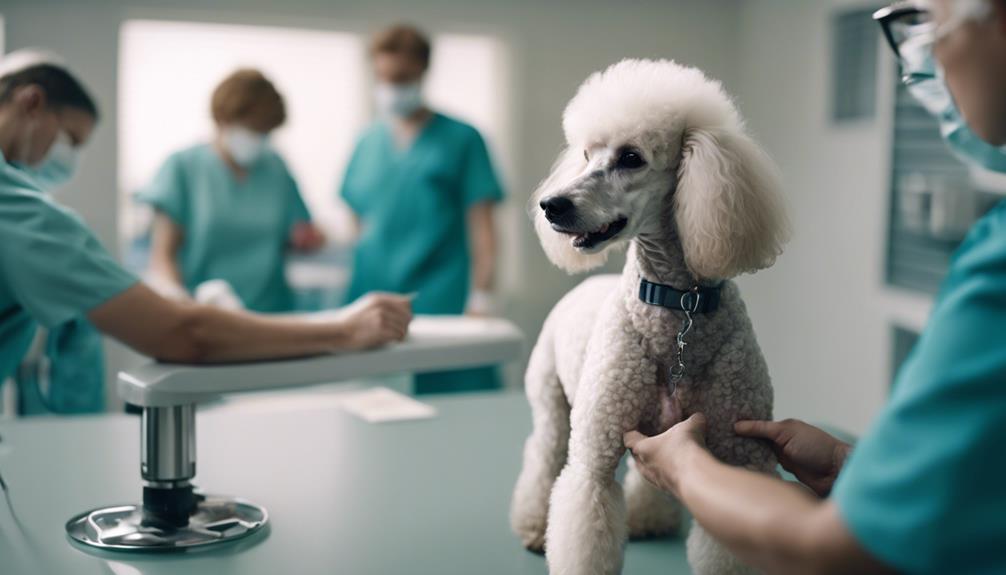
When considering the health of your Poodle, it's crucial to be aware of the common issues such as dental problems, hip dysplasia, and bloat that often affect this breed. Dental care is vital for preventing tartar buildup and gum disease in Poodles. Regular brushing and professional cleanings can help maintain good oral health. Hip dysplasia, a genetic condition, can lead to arthritis and lameness in Poodles. Monitoring weight, providing joint supplements, and regular exercise can help manage this condition. Bloat, a serious condition where the stomach fills with gas, is more common in deep-chested breeds like Poodles. Feeding smaller, frequent meals, avoiding vigorous exercise after eating, and knowing the signs of bloat are crucial in preventing this life-threatening condition.
| Common Health Issues | Prevention Tips |
|---|---|
| Dental Problems | Regular brushing and professional cleanings |
| Hip Dysplasia | Monitoring weight, providing joint supplements, regular exercise |
| Bloat | Feeding smaller, frequent meals, avoiding vigorous exercise after eating, knowing the signs of bloat |
Preventative Care and Regular Check-ups
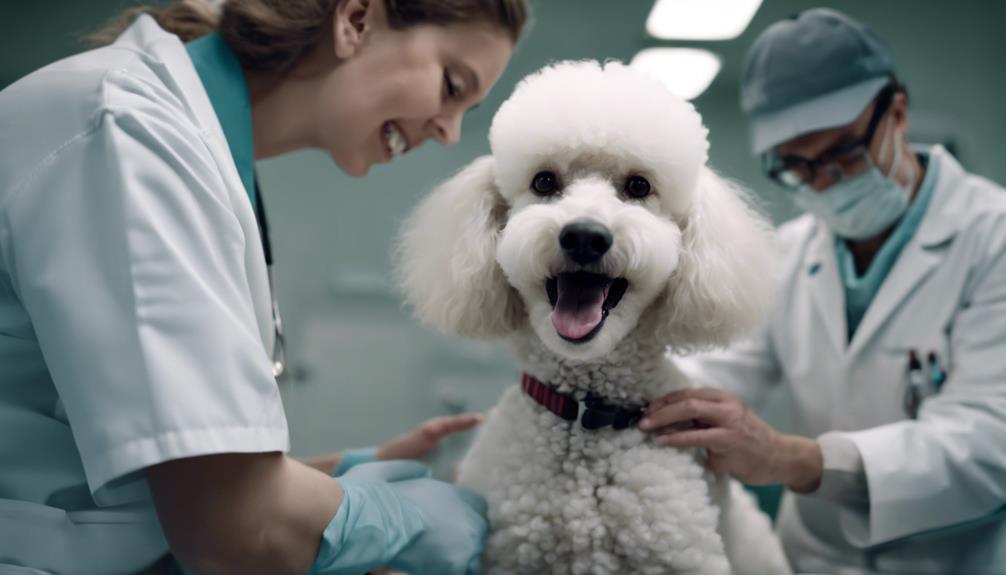
Ensure your Poodle's well-being by scheduling regular vet visits to catch any health issues early. Senior Poodles may benefit from more frequent check-ups to monitor their health closely. Prioritize preventative care for your furry companion to provide them with a long and healthy life.
Vet Visits Importance
For Poodle owners, prioritizing annual vet visits is essential to safeguard your furry companion's health through preventative care and timely check-ups. Here are some key points to consider:
- Preventative Care: Vet visits allow for preventive measures like vaccinations and parasite control, reducing the risk of illnesses.
- Early Detection: Regular check-ups help in early identification of health issues, enabling prompt treatment and better outcomes.
- Senior Poodles: Older Poodles may need more frequent visits to manage age-related conditions and maintain their quality of life.
- Financial Planning: Budgeting for routine vet visits and unexpected treatments is crucial to ensure your Poodle receives the necessary care without financial strain.
Health Screenings Schedule
To maintain your Poodle's optimal health, scheduling annual health screenings, including physical exams, blood tests, and vaccinations, is crucial. For senior Poodles, consider semi-annual check-ups to monitor age-related health issues. Budget for veterinary visits, with initial exam costs typically ranging from $50 to $70 for a comprehensive assessment. Don't overlook dental care as part of your Poodle's health screenings; regular cleanings and inspections can prevent dental issues. Additionally, saving monthly for unexpected medical treatments and emergencies ensures your Poodle receives prompt and necessary care. By staying proactive with health screenings and check-ups, you can help your Poodle lead a healthy and happy life.
Early Detection Benefits
Regular veterinary check-ups provide essential early detection benefits for your Poodle, ensuring timely treatment and improved overall well-being. Here are some reasons why routine vet visits are crucial for your furry companion:
- Preventative Care: Identifying potential health concerns before they escalate helps promote your Poodle's overall well-being.
- Timely Treatment: Early detection of conditions like dental problems, hip dysplasia, and bloat can prevent serious health issues.
- Improved Outcomes: Annual vet visits for complete body examinations and screening tests help detect underlying health issues, leading to better treatment outcomes.
- Routine Monitoring: Senior Poodles may benefit from twice-yearly check-ups to catch age-related health concerns early on.
Winter Care and Comfort

During the winter months, prioritize your Poodle's warmth and comfort by providing adequate shelter, cozy bedding, and access to unfrozen water when outdoors. Remember, different factors like breed, health, age, and size can affect how well your Poodle tolerates the cold. Watch for signs of discomfort such as whining or shivering, and make adjustments as needed. Keep a close eye on elderly or arthritic Poodles for signs of stiffness, providing extra care during walks in chilly weather. It's crucial to recognize frostbite symptoms in your Poodle, like cold extremities, and seek prompt veterinary care if necessary. By being attentive to your Poodle's needs and making adjustments accordingly, you can ensure they stay safe, warm, and comfortable during the winter season. Your furry friend relies on you for their well-being, so take the necessary steps to keep them cozy and protected from the cold.
Summer Heat Management

Prioritizing your Poodle's well-being during the summer heat is crucial to prevent heat stress and ensure their safety and comfort. As a caring Poodle owner, here are some essential tips to help you manage the summer heat effectively:
- Watch for Signs of Heat Stress: Keep an eye out for symptoms like red gums, heavy panting, glazed eyes, drooling, and a rapid heartbeat, which indicate your Poodle may be experiencing heat stress.
- Provide Cool Shelter: Offer a cool, shaded area for your Poodle to rest and relax during hot summer days to prevent overheating.
- Protect Paws from Burns: Avoid hot pavement that can burn your Poodle's sensitive paw pads. Consider using protective boots or paw wax and always check the pavement temperature before walks.
- Maintain Body Temperature: Use methods like cool water-soaked towels, fans, and pet-safe sunscreen to help regulate your Poodle's body temperature and keep them comfortable in the summer heat.
Frequently Asked Questions
How Do I Keep My Poodle Healthy?
To keep your Poodle healthy, focus on their dietary needs, exercise routine, grooming tips, preventative healthcare, mental stimulation, socialization skills, and training techniques. Stay proactive, attentive, and caring to ensure your Poodle's well-being and happiness.
How Do You Take Care of a Poodle in the Winter?
In winter, take care of your Poodle by grooming for the season, providing indoor exercise, protecting their paws, ensuring a winter coat, moisturizing their skin, adjusting their diet, and engaging in cold weather activities.
Are Poodles OK in Hot Weather?
You should always keep your Poodle hydrated, use cooling techniques like wet towels, provide sun protection, engage in indoor activities, offer shade options, avoid hot pavement, and maintain grooming practices to ensure their well-being in hot weather.
Should Poodles Be Shaved in the Summer?
You shouldn't shave Poodles in summer. Their coat acts as insulation, regulating body temperature. Shaving can lead to sunburn and skin issues. Instead, focus on grooming, shade, and hydration for a healthy, comfortable pup.
Conclusion
As a poodle owner, remember that your furry friend's health is a top priority in every season. Did you know that poodles are known to be one of the most intelligent dog breeds? By following these seasonal health tips, you can ensure that your poodle stays happy, healthy, and thriving all year round. Stay informed, stay proactive, and enjoy the special bond you share with your beloved poodle.
